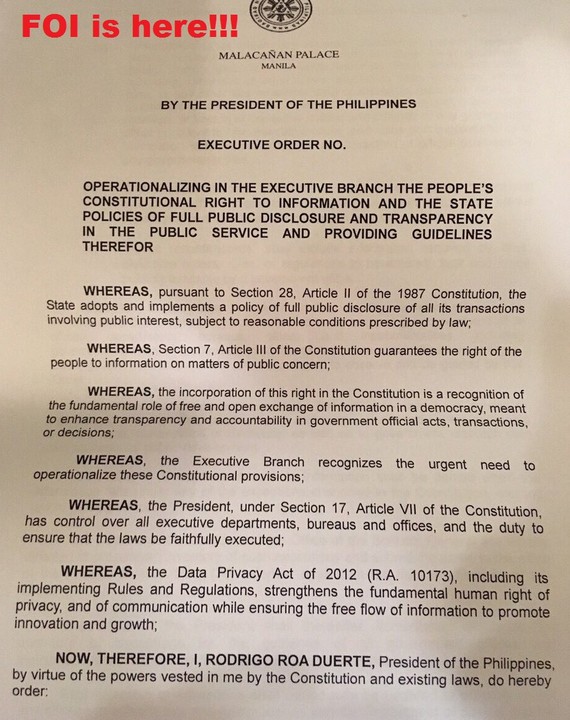The long wait is finally over for Filipinos clamoring for the passage of the Freedom of Information (FOI) bill, which has been stalled in Congress for years. President Rodrigo Roa Duterte has signed the Executive Order (EO) mandating Freedom of Information in the Executive branch.
The EO is “operationalizing in the Executive Branch the people’s constitutional right to information and the state policies of full public disclosure and transparency in the public service”. It further cites that the Executive Branch “recognizes the urgent need to operationalize” the Constitutional provisions that “guarantees the right of the people to information on matters of public concern”.

A copy of the FOI EO signed by President Duterte
Meanwhile, the Office of Presidential Communications on its Facebook page says, “Freedom of Information is the centrepiece of President Duterte’s platform of good governance. Transparency is now a cornerstone of the Executive Branch, ensuring the public of a government that is by the people and for the people”.
To recall, the implementation of FOI was a campaign promise of then presidential candidate Rodrigo Duterte. He vowed to make public documents and records more available to citizens and promote transparency in the government. The FOI bill (Senate Bill 1733) was passed on Third and Final Reading in the Senate on March 2014 but remains pending at the House of Representatives.
The newly signed EO is expected to be implemented immediately. It covers all government offices under the Executive Branch, including government corporations and state universities. No request for information shall be denied.
There will be some exceptions, however. According to Presidential Communications Secretary Martin Andanar, “Access to information shall be denied when the information falls under any of the exceptions enshrined in the Constitution, existing law or jurisprudence. The Department of Justice and the Office of the Solicitor-General are directed to prepare an inventory of such exceptions.”
Any person who requests access to information shall submit a written request to the government office concerned. It should include the name and contact information of the requesting party, provide valid proof of his identification or authorization, reasonably describe the information requested, and even the reason for or purpose of the request for information. The public official receiving the request, on the other hand, shall provide reasonable assistance, free of charge.




